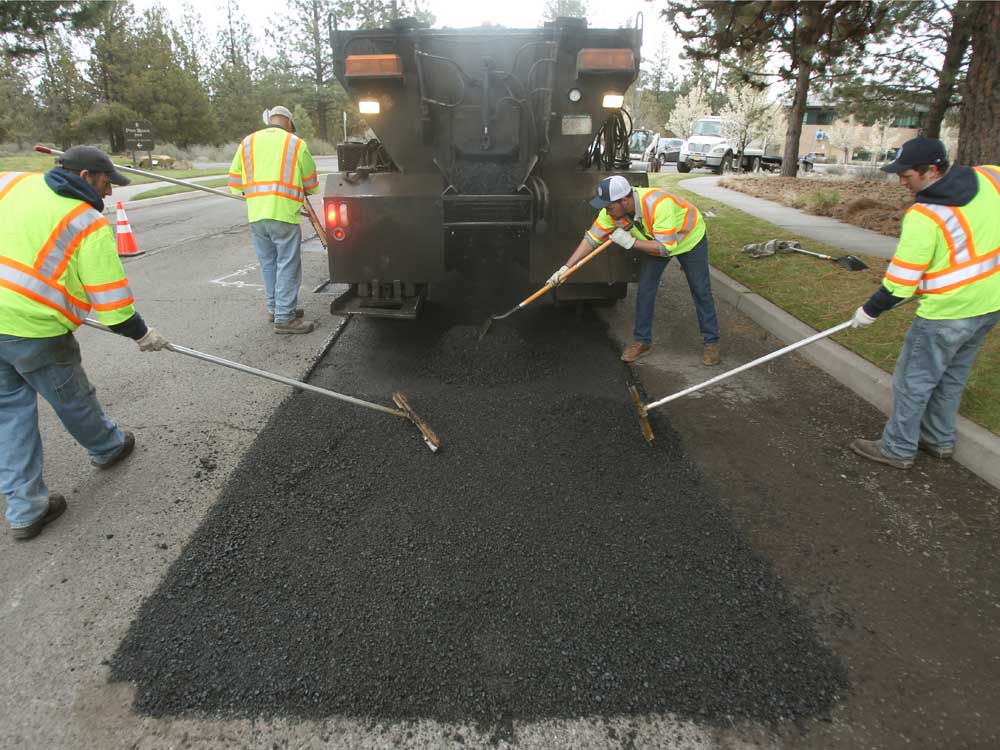Bend group: Make tourists pay for road improvements
Published 12:00 am Thursday, July 26, 2018

- City of Bend road department workers spread a layer of asphalt to repair a pothole on Mount Bachelor Drive. The city is considering its options for funding street repairs. (Andy Tullis/Bulletin file photo)
A limited local sales tax and a seasonal gas tax would make sure tourists help pay to build new roads and fix existing roads in Bend, according to a city group tasked with figuring out how to pay for the city’s transportation needs.
Members of Bend’s transportation advisory committee this week said they liked the idea of using gas taxes and sales taxes targeted at tourists, along with having residents pay for improvements through their property taxes and vehicle registration fees. The group won’t know until spring how much money will be needed for projects over the next 20 years, but it’s looking at ways to gather tens of millions of dollars beyond what the city would otherwise receive.
Trending
At least some of that money should come from tourists, said committee member Mike Riley, the executive director of The Environmental Center in Bend.
The city has about 21,600 tourists on any summer day, according to data compiled by Visit Bend and Regional Economist Damon Runberg, of the state Employment Department, but tourists only pay for road improvements through a portion of the 10.4 percent tax they pay to stay in hotels or vacation rentals in town.
The city tried last year to get another $350,000 a year from tourists to use for road maintenance by shifting how it divided lodging tax revenue between city services and tourism promotion, but a Deschutes County judge ruled that doing so violated a state law that aims to preserve room tax money for tourism-related purposes. The city’s now appealing that ruling.
Bend could still increase its total room tax, but state law requires 70 percent of every increase to be spent on tourism. In Bend’s case, that means that for every $10 collected by a room tax increase, $7 needs to go to Visit Bend to market the area to more tourists.
A local sales tax should be targeted at tourists, committee members said. It could apply only to goods such as food, beverages and rental cars.
“This is on here as a way to identify a good option for how to get money from tourists,” Riley said.
Trending
Oregon doesn’t have a statewide sales tax, but cities can adopt their own local sales taxes if they wish. Two cities — Yachats and Ashland — charge 5 percent sales taxes on prepared food and beverages, while a recent attempt to adopt a general 1 percent sales tax in the border town of Ontario was defeated by voters in May. In other states, local sales taxes are a common source of funding for city and county road repairs.
Bend voters overwhelmingly voted down a proposed 5-cent gas tax in March 2016, but committee members and city staff believe a seasonal fuel tax like the ones in Reedsport and Newport could be more popular. Reedsport’s 3-cent-per-gallon gas tax is only collected between May and November, while Newport charges 3 cents per gallon between June and October and 1 cent the rest of the year.
“If you can convince local residents that it’s going to be a tax on somebody else, they’re going to go for it,” said committee member Dale Van Valkenburg, director of planning and land use at Brooks Resources.
Local residents would still foot a large portion of the bill through additional property taxes. Committee members were especially interested in general obligation bonds, which are paid for by all property taxpayers and used to fund large capital projects and local improvement districts, which generally apply only to taxpayers in neighborhoods or smaller geographic areas. Bend’s most recent general obligation bond paid to reconstruct Reed Market Road and 14th Street, and local improvement districts have been suggested as a way to pay to pave dirt roads in the city.
Katy Brooks, a committee member and president of the Bend Chamber of Commerce, said general obligation bonds work if messaging around them is done correctly.
“This is where how we tell the story is going to matter,” she said. “Hey, Joe Schmoe, you’re paying X amount of dollars because of the GO bond, and here are three amazing projects you’re going to get for that.”
Committee members also liked the idea of further increasing fees developers pay to mitigate the effect trips to new homes and businesses will have on the city’s road system.
Other options favored by committee members are charging all businesses and households transportation utility fees and working with Deschutes County to implement a county vehicle registration fee.
Committee members nixed the ideas of increasing costs for business licenses, allowing advertising naming rights, instituting a payroll tax and charging tolls on roads, though the last two maintained support from some members. Riley wanted the payroll tax so large nonprofit employers like St. Charles Bend that don’t pay property taxes but do cause a lot of trips on city roads help pay, while committee member Richard Ross was interested in tolls for regional roads.
The business license increase was easier to kill, committee member Ruth Williamson said.
“If we don’t have the business community behind us on whatever package we go forward with, we’re just sunk,” she said.
— Reporter: 541-633-2160; jshumway@bendbulletin.com








